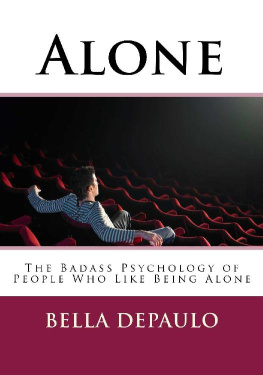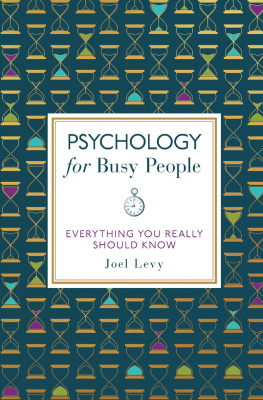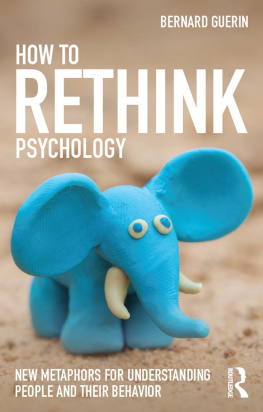Bella DePaulo, Ph. D .
ALONE: THE BADASS PSYCHOLOGY OF PEOPLE WHO LIKE BEING ALONE. Copyright @ 2017 by Bella DePaulo. All rights reserved. No part of this book may be used or reproduced in any manner whatsoever without written permission except in the case of brief quotations embedded in critical articles or reviews. For information, contact the author.
ALONE may be purchased for educational, business, or sales promotional use. For information, contact the author.
Preface
A loneliness panic has swept the nation and the world. For years, the popular press and the annals of academia have been spewing out warnings, in increasingly alarmist tones, that loneliness has reached epic proportions, and that it is killing us.
But amidst all the angst about loneliness, something profoundly important has been overlooked: Some people like being alone. They like their time alone. They like living alone.
In many nations all around the world, the number of people living alone has reached record levels. More and more people are also dining alone, traveling alone, and making their way in public places alone. Studies of married couples in the U.S. show that their lives are less enmeshed than they once were. Some couples are even living apart, in places of their own, not because far-flung jobs or other externalities have forced that upon them, but because they want their own space.
For unknown numbers of people, being alone is not just a preference it is a craving, a need. Deprived of their time alone for too long, they begin to fantasize about it. Nothing feels quite right until their need for solitude is replenished.
Who are these people who like being alone? Stereotypically, they are the weirdos and the freaks, the scary loners planning shocking acts of violence. New thinking and fresh research upends those caricatures. We now have a better idea of the true personalities of people who like being alone, and they are, well, totally badass.
In June of 2017, I published a post to my Living Single blog at Psychology Today called The badass personalities of people who like being alone. Immediately, it took off. It was shared and re-shared. It was republished over and over again, with and without permission. It got picked up nationally and internationally.
That made me realize that there is a real hunger for a different story about the time we spend alone, one that acknowledges that not all people who live alone or spend time alone are lonely or doomed to an early death. Some, in fact, are spectacularly happy and healthy.
Ive been writing about people who live single or live alone or like their time alone for decades. In Alone: The Badass Psychology of People Who Like Being Alone , I have collected more than 60 of the articles I have published at places such as Psychology Today , Psych Central , and the Washington Post . Sample what you like or read it cover to cover. Either way, you will come away with a whole new understanding, grounded in research, of what it means to like being alone.
Bella DePaulo
Summerland, CA
October 2017
BellaDePaulo.com
[Note to readers of the print version of this book: Words or phrases that are underlined will show up as links in the e-book version.]

The True Meanings of Alone,
Loner, and Lonely

The Happy Loner
Loners get a bad rap. Loner is the label we affix to criminals, outcasts, and just about everyone else we find scary or unsettling. In my all-time favorite book on the topic Party of One: The Loners Manifesto author Anneli Rufus offers a whole different take on the true meaning of loner. A loner, she says, is someone who prefers to be alone. That person is so very different than all those who remain on the outside feeling isolated but so desperately wanted to be on the inside, feeling that they belong. The intense but thwarted craving for acceptance, approval, coolness, companionship is what sometimes sets off people who go ballistic on their objects of their desires.
In an essay in the Guardian , Barbara Ellen lets us know that she has also had enough of the fear and the pity for people who actually like their time alone . Heres how she opens her commentary:
There used to be a fashion for scaremongering surveys about single women, saying things like: "Eight out of 10 women are going to die alone, surrounded by 17 cats." But to that I would mentally add: "Or it could all go horribly wrong." To my mind, aloneness never necessarily equated with loneliness. It wasn't a negative, something to be avoided, feared or endured.
In the tradition of Anneli Rufus (and everyone else who recognizes that alone and lonely are not the same thing), Ellen know that the kind of solitude that is chosen is a whole different experience than the type that is unwelcome. Riffing on a headline proclaiming that Britain is the loneliness capital of Europe, Ellen offers an alternative perspective:
This study could just as well be interpreted as saying that many Britons are self-reliant problem-solvers, respectful of other people's privacy and what's wrong with that? Isn't this the modern British definition of neighbourliness: not over-chummy and intrusive, but friendly, considerate and, most importantly, happy to sign for your Amazon parcels?
Barbara Ellen also poses a question that we should all ponder: Why is it that sociability is considered a skill, whereas the ability to be alone is seen as weird? As she notes:










